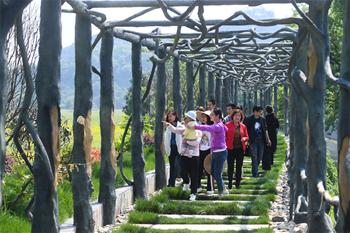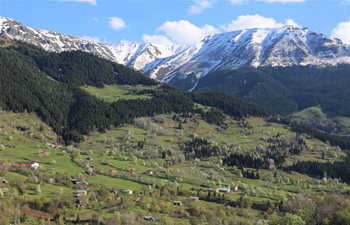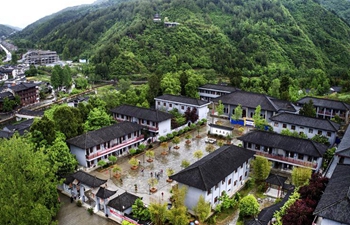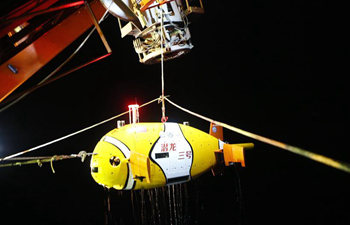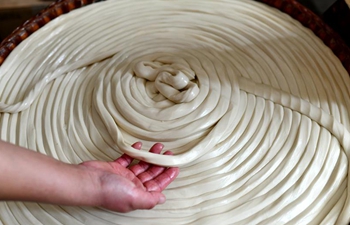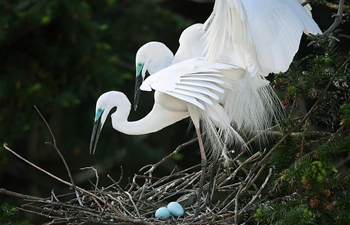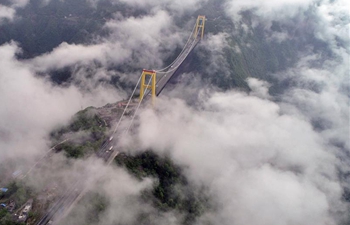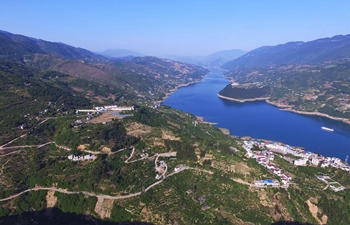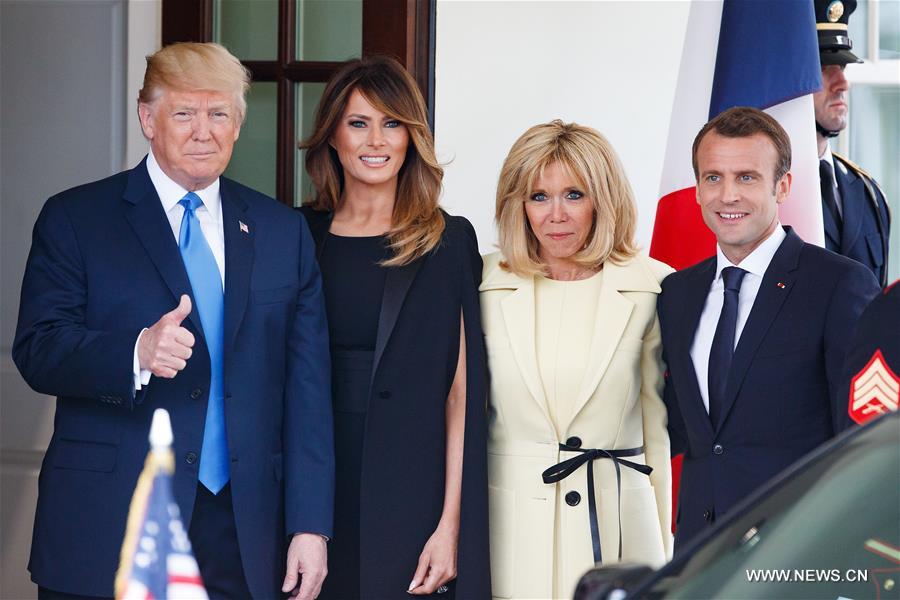
U.S. President Donald Trump (1st L) and First Lady Melania Trump (2nd L) pose for photos with French President Emmanuel Macron (1st R) and his wife Mrs. Brigitte Macron at the White House in Washington D.C., the United States on April 23, 2018.(Xinhua/Shen Ting)
by Xinhua writers Zhu Dongyang, Liu Chen
WASHINGTON, April 24 (Xinhua) -- French President Emmanuel Macron on Tuesday reached agreements with U.S. President Donald Trump on efforts to fix the Iran nuke deal to "contain" Tehran, but bilateral disparities remained as Macron's state visit to the United States was about to end.
NEW IRAN DEAL
Macron has made efforts to salvage the Iran nuclear deal, internationally known as the Joint Comprehensive Plan of Action (JCPOA) signed in 2015, which Trump has slashed and threatened to leave ever since his inauguration.
As the "deadline" for his final decision on May 12 drew closer, Macron on Tuesday proposed to work with Russia and Turkey to forge a new deal with Iran.
Speaking at a joint press conference with Trump, Macron said that the new deal would cover four topics: to block any nuclear activity of Iran until 2025, to ensure that there is no Iranian nuclear activity in the long run, to put an end to Tehran's ballistic activities in the region, and to generate the conditions for a political solution to "contain" Iran in the region.
The current agreement, which doesn't include measures to curb Tehran's missile ability and regional influence, was not "sufficient," he said. "But once we are placing ourselves in ... a broad agreement ... we take on board the concerns and the criticism of President Trump regarding this deal."
Macron's statement seemed to win Trump's approval, as the White House said that the new offer is "a pretty good idea."
However, Trump refused to say whether he will accept the new deal and leave the old one.
"But we'll see ... whether or not it will be possible to do a new deal with solid foundations," he said. "Because this (is) a deal with decayed foundations. It's a bad deal. It's a bad structure. It's falling down. Should have never, ever been made."
Trump will decide whether to leave the JCPOA on May 12. Judging by Trump's recent pejorative tone towards Tehran and the deal, the chances of the United States remaining are increasingly slim.
"But no matter the decision that President Trump will take, what I would like is to work, as from now, on a new deal with four pillars," said Macron.
WITHDRAW FROM SYRIA? NOT NOW
Before arriving in Washington, Macron vowed to convince Trump not to call the U.S. troops in Syria back home soon.
His goal was met halfway in the White House, as Trump said that though he would still love to withdraw the U.S. troops from Syria soon, he does not want to give Iran "open season to the Mediterranean, especially since we really control it."
"We'll be coming home. But ... we will have a strong blockage to the Mediterranean, which to me is very important -- because if we don't, you have Iran going right to the Mediterranean. Not going to have that," said the White House host.
Still, he complained about the U.S. involvement in Syria.
"They have to step up tremendously -- not a little bit, but tremendously -- their financial effort ... And they will also put soldiers on the ground, which they're not doing. And we will, in fact, bring lots of people home," Trump said.
He urged "very rich" regional countries to step up their contributions -- militarily and financially -- to the military operations in Syria, so as "to prevent Iran from profiting off the success of our anti-ISIS effort."
Trump's offer came with a price. Macron promised to increase the French contribution in the war against the Islamic State (IS) in Syria, and agreed to include the Syria issue in his new deal to curb Tehran's influence, something Trump has demanded many times.
"In the long run, we need to win peace and make sure that Syria does not fall into hegemony in the region," he said. "The approach ... means that we can work ... to contain Iran in the region."
Trump echoed that by saying that "when they made the Iran deal, what they should have done is included Syria."
"They should have made a deal that covered Yemen, that covered Syria, that covered other parts of the Middle East where Iran is involved," he said.
DIFFERENCES REMAIN
However, Macron admitted that he still has "a disagreement" with Trump regarding the JCPOA.
"I always said we should not tear apart the JCPOA and have nothing else. I think this would not be a good solution," he said.
On the Syria issue, to Macron's disappointment, Trump said that "the United States is embarrassingly into the Middle East," adding that he would pull lots of troops out.
The two leaders also clashed on trade tariffs.
Speaking before their expanded bilateral meeting, Trump said "trade with France is complicated, because we have the European Union."
"The Union is very tough for us. They have trade barriers that are unacceptable," he said. "We have to make a change ... It's been very unfair for a long time. We had a trade deficit with the European Union of 151 billion U.S. dollars last year. That's unacceptable."
For his part, Macron said it's very important to bear in mind that "it's impossible to make any trade war" between allies "especially when you work so closely together on security issues like Iran and Syria."
The two also failed to make convergences on the Paris climate accord, as Macron said in the press conference that "France will continue to work on major pieces, including the global compact for the environment."
Darrell West, senior fellow at the Brookings Institution, told Xinhua that there have been many ups and downs in the French relationship with Trump.
"European leaders are disappointed when the United States pulls out of the Paris climate accord, criticizes the Iranian nuclear agreement, and imposes tariffs on other nations. All those things make it difficult for them to continue long-held policies," he said.
(Matthew Rusling in Washington also contributed to the story.)




